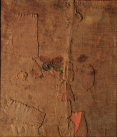Abstract
The classical learning of medieval readers, especially those fortunate to have access to a good library, could be formidable. But in the Middle Ages knowledge was also a commodity, and there was powerful temptation to satisfy intellectual hunger with compressed, simplified digests and easy fare. One text, De vita et moribus philosophorum, long attributed to Walter Burley, seems to have achieved particular success in satisfying that hunger for an easy version of ancient lore. Its roots reach back to Diogenes Laertius' Greek Lives of the Philosophers. This essay explores the roads of transmission that led to the making of De vita et moribus philosophorum, which fed a popular fascination with ancient philosophy and the lives of ancient philosophers. Through what channels did the 'history' of ancient philosophy find a readership beyond the scholarly academy, and how can we explain the appeal of such classical knowledge?
Except where otherwise noted, the content of this site is licensed under a Creative Commons Attribution-ShareAlike 4.0 International (CC BY-SA 4.0).
Authors retain copyright of their work. The CC BY-SA 4.0 licence allows readers to copy and redistribute the material in any medium or format, and to remix, transform, and build upon the material for any purpose, even commercially, as long as the original author is credited and as long as any works that are derived from the original are distributed under the same terms.

